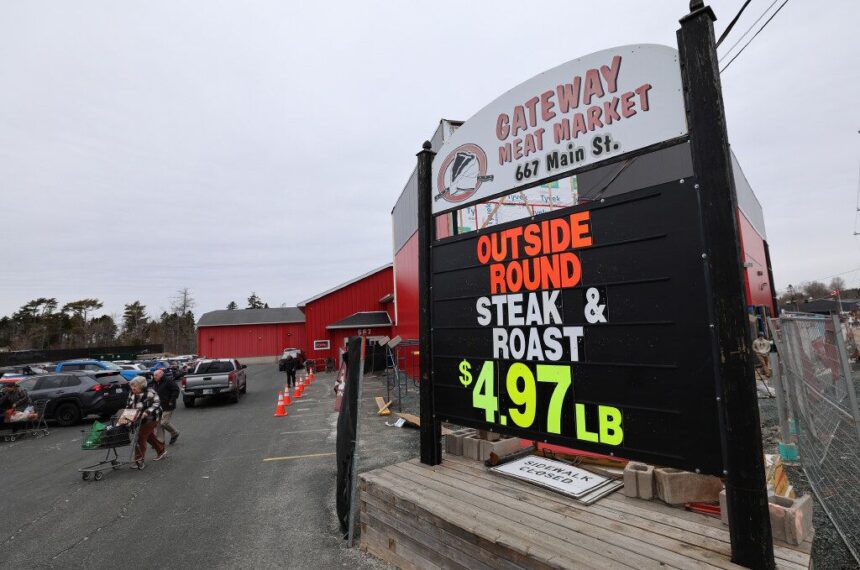Published Apr 03, 2025 • Last updated 1 hour ago • 5 minute readGateway Meat Market in Dartmouth on Thursday, April 3, 2025.Seeking inexpensive fresh produce, beef, chicken and pork, shoppers pushed into the crowded Gateway Meat Market over the noon hour Thursday. “It’s the prices, you get things cheaper,” Maureen Sullivan of Tantallon said as she exited the seemingly always busy compact store independently owned and operated on Main Street in Dartmouth since 2008.Finding quality meat and produce at discounted prices is very important, says Sullivan, who makes regular Gateway runs from Tantallon to Dartmouth.THIS CONTENT IS RESERVED FOR SUBSCRIBERS ONLY.Subscribe now to access this story and more:Unlimited access to the website and appExclusive access to premium content, newsletters and podcastsFull access to the e-Edition app, an electronic replica of the print edition that you can share, download and comment onEnjoy insights and behind-the-scenes analysis from our award-winning journalistsSupport local journalists and the next generation of journalistsSUBSCRIBE TO UNLOCK MORE ARTICLES.Subscribe or sign in to your account to continue your reading experience.Unlimited access to the website and appExclusive access to premium content, newsletters and podcastsFull access to the e-Edition app, an electronic replica of the print edition that you can share, download and comment onEnjoy insights and behind-the-scenes analysis from our award-winning journalistsSupport local journalists and the next generation of journalistsRegister to unlock more articles.Create an account or sign in to continue your reading experience.Access additional stories every monthShare your thoughts and join the conversation in our commenting communityGet email updates from your favourite authorsSign In or Create an AccountorArticle contentA Narrative Research poll released two days before the March 23 call of the federal election found that 59 per cent of Nova Scotia respondents tagged the cost of living, of which food prices are a major component, as a major election issue.Sullivan was more interested in grocery prices than talking about election issues.“They are full of promises but whether they do it or not …,” she said of which party might be best positioned to help with cost of living issues.James McNeil, an associate professor of economics at Dalhousie University in Halifax, said the cost of living and the Trump tariff issue, which was identified as a major issue by 49 per cent of Nova Scotia respondents in the Narrative poll, are intertwined in a couple of ways.“One would be if Canada were to impose retaliatory tariffs,” McNeil said. “Tariffs tend to be inflationary because they are a tax on imported goods so any increase in prices of goods we’re importing, things like food, for example, would directly increase the cost of living.”Article contentMcNeil said it’s too soon to measure that effect without specifics of retaliatory tariffs.“The Canadian government has so far seems to have been quite strategic in where they are imposing these (retaliatory) tariffs,” McNeil said. “You can think of tariffs more on whisky and less on things like tomatoes or produce that we might be importing that would be more of necessities which would more directly affect cost of living.”McNeil said a more significant cost of living concern in areas of the country that trade a lot with the U.S., like Ontario, is the direct effect of unemployment.“Tariffs on cars, there are hundreds of thousands of people in Ontario working in that sector, so if you lose your job, the cost of living is certainly affected, maybe not in the way we usually think of it as prices are going up but in the sense that your income is falling a lot.”McNeil said main drivers of cost of living are “things we think of as necessities, food, housing and or rent, gasoline for those who rely on cars to commute.”Article content Customers chasing discount meat and produce prices come and go at Gateway Meat Market in Dartmouth on Thursday. Photo by Francis Campbell /The Chronicle HeraldHe said rising product costs in Nova Scotia or Canada will likely depend on the counter-tariffs that Ottawa imposes on American goods coming into this country. “I don’t anticipate that they (Canadian policy makers) would impose them on goods that Canadians consume a lot of, “just because it tends to be self-destructive,” McNeil said. “Then there’s the effect of reduced employment from sectors that are affected. We know that here in Nova Scotia, fisheries are going to be affected quite a bit, not just from the U.S. but also from tariffs imposed by China. People working in that sector will be quite affected because of lower prices for fishermen in the product they are selling but also potentially less employment.”With the election campaign in full swing, McNeil said there are a lot of fiscal and monetary tools at the disposal of Canada’s federal government to deal with the fallout of the Trump tariffs.“Monetary policy would be reductions in interest rates and that tends to stimulate the economy and it can also improve the cost of living,” McNeil said. “If you have a mortgage, for example, and the interest rate falls, then your cost of housing is reduced.Article content“That tends to be a bit of a blunt instrument because the main policy interest rate tends to affect all interest rates in a similar way, so it’s harder to use that to provide relief for specific areas of the economy.”McNeil said fiscal policy tends to be more targeted.“We’ve already heard the federal government discussing providing relief to specific sectors that would be most affected. Tariffs on cars, we know that’s going to affect the auto-making sector in Ontario so you could imagine specific programs to try to relieve pressures there, loans to businesses, for example, or extended employment insurance programs for people affected in those sectors.“There are lots of things they can do and we will just have to wait and see what the government decides to go with.” The Gateway Meat Market in Dartmouth is being renovated and expanded. Photo by Tim Krochak /The Chronicle HeraldMcNeil said Canada must tread cautiously with retaliatory tariffs.“The reason that economists in general don’t like tariffs is that they raise prices and that is bad for consumers and while tariffs might protect a certain industry, they tend to raise prices for other goods and also appreciate the exchange rate which makes other exports less attractive.Article content“It’s what we call a crowding out effect, so if you impose tariffs on imported blueberries, that’s very good for Nova Scotia blueberry growers but that tends to make other products made in Nova Scotia less attractive, wine for example.”McNeil said you wouldn’t want to impose tariffs on all American products because Nova Scotia imports a lot of food from the U.S., food that is hard to grow here.McNeil said “the most likely possibility at this point” resulting from the American tariff policy is a Canadian recession.“Trade is an important sector for the U.S. economy but for Canada, it’s much larger as a percentage of our GDP and the U.S. is our largest trading partner so any disruption to trade because we trade so much with the U.S., … you would definitely anticipate that would perhaps lead to a recession in the short run.” McNeil said there is so much uncertainty on the tariff front that it is difficult for any of the federal party leaders to say definitively what they should do in response.Article content“Who knows what would be the best response based on an uncertain outcome in the U.S.”At Gateway, Sullivan didn’t want to discuss Trump aside from saying “it’s disturbing, very disturbing.”Ivan Langille of Enfield, who comes to Gateway once a month to take advantage of discounted prices, said he didn’t want to talk about the federal election either.“As long as the Liberals win that’s all I need to know.”Langille, 82, said all the federal Canadian leaders are “out for what they can get, like Trump,” and are not likely to ease any cost-of-living problems.McNeil chose not to endorse any party or leader, saying “in any crisis like this, you’re looking for a steady hand on the wheel, someone with lots of experience in policy-making in the past and can apply that knowledge in another context.”He said it’s challenging to provide constructive advice that might allay the fears and anxiety of Nova Scotians during this macro-economic crisis.“So much of it is out of your control,” McNeil said. “Any individual person, you can only make decisions that influence your own life, how much to work, how much to save. Out of your control is what the Trump administration is going to do today or tomorrow or the day after that.“That makes any advice a little bit challenging.”Article content
Tariff anxiety, cost of living dominate ballot issues in N.S.










